Death Note: Volume 1 (UK) (DVD)
Introduction
That isn't an ability that comes at the top of most superpowers when you come to think about it, the power of fatality. There certainly isn't a Death-man among Marvel's pantheon, and it's usually a power left to the supernatural, figures like the Grim Reaper. But it certainly makes for a compelling debate. What would happen if a person possessed the ability to end life just by choosing to? Surely in the wrong hands it would be a devastating power, but in the right hands… Even I can think of a couple of individuals whose absence would brighten up the place no end. The world is a harsh place at the best of times, and removing the criminal element, the psychopaths, the serial killers, surely that would only be a boon to society. The same with rapists and other sex criminals. What about thieves, fraudsters, careless drivers? Where do you stop? Whose are the right hands? What would that power do to the person that possessed it? All those questions and more are explored in the series Death Note, one of the most hotly anticipated anime series to come from Japan, and one that has already spun-off 3 live action films.
The manga by Tsugumi Ohba has already swept the world, and this 37 episode series now comes to the UK courtesy of Manga Entertainment, leaving in its wake no end of controversy. The manga has been subject to censorship and outright bans in China, where it is accused of perverting the minds of the young, while in the US, Death Notebooks are turning up in high schools with student and staff names in. It's led to student suspensions and even arrests; in a country with a bizarre attitude to gun control meaning such threats have to be taken very seriously. In the UK, the first volume of Death Note gets rated 12. Bit of a storm in a teacup then…
Ryuk is a Shinigami, a Death God. The Shinigami exist to shepherd souls across to the other side, and where convenient give them a helping hand. This is done by means of the Death Note, a book in which the Shinigami write the name of the soon to be deceased, and an optional cause of death, and that prediction duly come to pass. But Ryuk is bored. Being a Shinigami isn't all that it used to be, and his peers just spend eternity sitting around gambling or sleeping. He needs a little entertainment. Light Yagami is a high school student; actually he is an exemplary high school student, fiercely intelligent and regularly scoring the highest grades in Japan. The world could be his oyster, except that with nothing to challenge him, he is bored. That's until the day that the Death Note 'accidentally' falls into his school grounds. Initially sceptical of a prank, or a sick joke, he's about to dismiss it from his mind, but curiosity urges him to pick it up, and try it out. He stunned when it actually works. Soon he has a plan to clean up the criminal, the sick and depraved, and remove them from the world, crafting his ideal society, a society over which he will have the power of a god. But for the authorities, murder is murder, and a sudden rash of unexplained deaths among criminals surely must be connected. Soon it is Light who is being hunted.
The first volume of Death Note from Manga Entertainment has the first eight episodes spread across two discs, along with some extra features.
Disc 1
1. Rebirth
Light Yagami is initially sceptical when a notebook titled The Death Note practically falls into his lap. He's willing to give it a try, but being a moral upstanding man, he has to find someone deserving of death. That becomes obvious when a deranged criminal takes a classroom full of children hostage. As Light watches the drama unfold on the news, he writes the criminal's name in the book, keeping his mug shot in mind. To his shock, the hostage crisis is resolved when the criminal dies of a heart attack. While he is momentarily aghast at what has happened, the possibilities of the Death Note quickly become clear. Meanwhile, Shinigami Ryuk has realised that his Death Note has gone missing, and he heads for the human realm to find it. Five days have passed when he finds Light Yagami, and Light has been hard at work with the Death Note. Realising the Death Note's supernatural powers, he has also been expecting a visitation. Only the current owner of the Death Note can see Ryuk, but Ryuk isn't the vengeful Death God that Light has been expecting. On the contrary, Ryuk has finally found some entertainment, and he's happy to stick around to see what Light will do next, as well as avail himself of some apples. It's also a chance for him to explain the rules of the Death Note.
2. Confrontation
All those unexplained criminal deaths were bound to attract attention, and at the ICPO Interpol conference, there is no other topic of discussion. The idea of vigilante justice is appalling enough, but the sheer scale of the phenomenon causes tensions to arise in the conference hall. The decision is made to call in 'L' to investigate the spree of deaths. L is a mysterious figure that has never been seen, and communicates through a laptop with his voice distorted. Yet he has solved some of the most baffling crimes and is a notoriously brilliant detective that police forces the world over often consult with. Unsurprisingly when he is contacted, it transpires that he is already on the case. Light on the other hand has been getting ahead of himself, passing down judgement like a vengeful deity. A cult phenomenon has already built up, with Joe Public cheering on 'Kira' as he cleans up the streets. But Light isn't stupid. He's been expecting a backlash from the authorities. He isn't expecting L to appear on television throwing the gauntlet down to Kira.
3. Dealings
Light has an ace in the hole. His dad is a policeman, in fact he is the man in charge of the Japanese investigation into Kira, and courtesy of a little judicious hacking, he knows everything the police know, and is comfortably one step ahead of L's investigation, or so he thinks. L has already narrowed down Kira's location to the Kanto province in Japan, and he is aware from the timing of the deaths that Kira must be a student. Yet the investigation is already in trouble, with members of the team ready to quit when it becomes apparent that Kira can strike from a distance and without warning. Yet Light has rules to follow. He has to know the exact spelling of the name of the victim, and has to keep the victim's face in mind when writing that name. With L realising that the mole in the police force will stop him from getting close to Kira, he gets a little outside help to investigate prominent members of the investigation and their families. Soon there is an FBI agent tailing Light. It would be an easy problem to solve, if only Light knew the name of the FBI agents in Japan. Then Ryuk makes him an offer.
4. Pursuit
Ryuk's solution demands a high price, but Light has figured out another way to find out who is tailing him. It means acting like a typical high school student though, and going out on a date to a theme park with a girl. It's a pleasant enough trip, then all of a sudden a gunman boards the bus and takes the passengers hostage, demanding a ransom.
Disc 2
5. Tactics
Light has FBI agent Raye Penber's name, but how to use it? Simply eliminating him will leave him at square one when there is a whole team of FBI in Japan hunting for the link between the police and Kira. As the mind games between Light and L continue, there's trouble in the police department heading up the investigation, as trust between L and the police crumbles. Members of the investigation choose discretion over valour, especially when it comes to a foe that can kill at a distance, needing only an identity to strike. Then Light comes up with a plan to deal with the FBI.
6. Unraveling
L is breaking the habit of a lifetime when he invites the remaining members of the investigation to meet with him face to face. But given the fragile relations between him and the police, it's a necessary move. It also serves to strengthen the bond between those few men who are utterly committed to defeating Kira, and serves to re-enthuse them all. Meanwhile Light has been going over his actions so far, searching for flaws and mistakes that L can exploit. He's thrilled by the battle of wits, and feeling pleased with himself seeing his plan come to fruition. But when he runs an errand for his mother down to the police station, he runs into someone unexpected, Raye Penber's grieving fiancée. And she's figured out something about Kira's modus operandi that no one else has realised.
7. Overcast
Light has another hindrance to remove on his path to a new world order, and he's quick to write the name down in the Death Note. Yet for once, Ryuk is finding the whole matter hilarious, and then when the appointed hour comes, nothing happens. Could the Death Note have failed?
8. Glare
L and the task force return to the FBI murders to see if there is some more tangible link between the order of their deaths and Kira. It becomes clear that the pivotal point hinges around Raye Penber, and backtracking his movements offers some tantalising leads. He was investigating two high-ranking police officers and their families. One of those officers was Soichiro Yagami. L insists that Yagami's whole family be placed under surveillance. Is the net finally closing in on Light?
Picture
Death Note gets a 1.78:1 anamorphic transfer that is typical of modern anime. It's clear and sharp enough, with only the barest of NTSC-PAL transfer signs worth mentioning. For a series that is some 37 episodes in length, you would expect a few corners to be cut and money be saved when it come to the animation. Not in the case of Death Note though, as the animation courtesy of Madhouse Studios is top notch. The character and world designs are excellent, and the level of detail and fluidity of motion speaks to a high investment in the animation. The look of the show suits the story well, with the Shinigami realm a suitably dark and creepy otherworld, while the city gets a cold impersonal feel, with everything in pastels and understated. As you would expect from a show with such dark themes, there's plenty use of shadows and moody lighting. It makes for a rewarding viewing experience.
Sound
You have a choice of DD 2.0 English and Japanese, with optional translated subtitles and a signs track. You won't get any complaints from me when it comes to the English dub, which is cast very well. All the voices suit their characters, and the performances live up to the hype surrounding the anime. Of course my preference as always is for the original language track, and there were no problems here either. The themes for the anime follow the current vogue for rock soundtracks, and are pleasing enough on the ears, but the incidental music is really quite notable, taking a leaf from Danny Elfman when it comes to spooky and quirky, and certainly suits the bizarre Ryuk character down to a T.
Extras
Multiregionism strikes again with an anime release. Depending on which region you purchase from, you get slightly different discs. Viz are releasing the show in the US, where in addition to what you get here, you also get some audio commentaries on each disc. Madman's Australian release has ditched the commentaries for the first two volumes. The UK release sees the commentary on disc one omitted, but included on disc two. Both the Australian and US releases have special editions that bundle character figurines with the discs. We in the UK don't get any of that. What we do get however is the series released in significantly cheaper 2-disc sets, meaning all 37 episodes should eventually be released in four instalments instead, of the eight that other territories will see. What we also get, and what US customers lack, is a separate signs track to accompany the English dub, something that is essential in a show which has a lot of on-screen text to translate. I also think this is a first for Manga Entertainment, as I certainly don't recall them adding a signs track to their anime releases before. Hopefully they will maintain consistency through Death Note's run.
The discs get some snazzy animated menus, as per your usual anime release.
Disc 1
Here you'll find the Bleach trailer, the clean credit sequences, and a sixteen page Production Art gallery.
The main extra is a Behind The Scenes Featurette that takes a look at the ADR process, with contributions from ADR Director Karl Willems and voice of Light, Brad Swaile. This lasts 12 minutes
Disc 2
Behind The Scenes Part 2 takes us back to the recording studio, where Karl Willems this time introduces us to Alessandro Juliani, English voice of L. Once again they talk about the recording process in a featurette that lasts 9 minutes.
The Japanese Director Tetsuro Araki and Character Designer Masaru Kitao are interviewed in a featurette that lasts 12 minutes. They talk about keeping the anime faithful to the manga, and avoiding the pitfalls of adaptation.
The audio commentary accompanies episode 7, and sees Associate Producer Jiro Okada, and Tabitha St. Germain, voice of Naomi Misora chat about the episode, the show in general and the characters in a light-hearted yet informative track.
Finally there is another Production Art Gallery, this time comprising 12 images.
Conclusion
Death Note comes to the UK, surfing a wave of controversy and with a massive amount of hyperbole. With that sort of fanfare, it would be hard if not impossible for the final product to live up to expectations. Consequently, Death Note isn't the best thing since sliced bread, or the coming of the anime Messiah. Fortunately, I had mitigated my own expectations by getting hold of a few volumes of the manga, and knew roughly what I was letting myself in for. Still, with Death Note's notoriety, it's hard not to expect something a little beyond the ordinary.
Once you get past the hype, and the Daily Mail baiting premise, Death Note turns out to be a neat little detective show, with a cat and mouse dynamic for its main characters that is really quite compelling. Light Yagami is the textbook case of absolute power corrupting absolutely, as his initial horrifying discovery of the Death Note quickly turns into sociopathic tendencies. Of course he's the 'type', a hard working, over achieving student, aloof and with a superior attitude, and supremely self-opinionated. The story teases us into liking him though, and our sympathies are with him from the beginning, despite his personality. After all, his first use of the Death Note resolves a hostage crisis in a school, his second rescues a young girl from the lewd attentions of a biker. He's saving lives. And who can fault him for wanting to clean up society, and get rid of those hardened criminals? He's well aware that by using the Death Note, he's hardly the ideal citizen for his ideal society, but he rationalises that by indicating that every society needs a leader. But by then the hard questions start to be asked. Just who chooses who the criminals are, and should you even be killing them when they are no threat to society, locked away in prison? It's something the police can't countenance, and naturally they act to stop a mass murderer. You could say that this is the point that Light crosses the line, although in actuality he crossed it the moment he used the Death Note in cold blood. But the anime has taken us from having sympathy for Light to a point where he's the show's villain, certainly not an antihero, although some part of me still roots for him.
It's at around this point that we meet who is ostensibly the show's protagonist, L. Except L is practically a mirror image of Light, a young prodigy of a detective, whose sheer skill and ability have him firmly in demand with the world's police forces, yet whose introverted and obsessed personality keeps him at a distance. The thrill of the chase, and proving his ability is more important to him than the moral questions raised by the Death Note killer. In fact, he's just as callous as Light in many ways, his first challenge to Light has him sacrificing a death row inmate just to see the extent of Kira's abilities, and the loss of the FBI agents in Japan really only affects him on an intellectual level. He's also an interesting character visually, neurotic to the extreme, with the ruffled appearance of a serial insomniac with sunken eyes, and with a tendency to perch on the edge of his chair like some genius vulture.
Ryuk, the Shinigami, the supernatural element to the show that introduces Light to the Death Note complete the third part of this triangle. If there is a societal theme of the show, it is the ennui of society, the sheer boredom that pushes unmotivated citizens to ever more bizarre means of seeking entertainment. Ryuk is bored when we meet him, a Soul Reaper with no souls to reap, living among a Shinigami society that has fallen into senescence and obsolescence. It's his need for new experiences that leads him to 'lose' his Death Note in the human realm. It's one of the rules of the Death Note that the Shinigami who drops the Death Note must remain with the human that picked it up; in order to eventually retrieve it. But in Light Yagami, he finds a kindred spirit, another person who is utterly bored with his life. When Light starts using the Death Note in ever more inventive ways, Ryuk decides to stay with him just for the sheer entertainment value. Only Light can see him, so he's always hovering over Light's shoulder, cheering him on as he wreaks his havoc on the criminal world, or having a good giggle when Light starts blundering. He has no obligation to Light, but slowly the two characters start to warm to each other.
So commences a battle of wits between Light and L. With Light accomplishing his mission at the point of a pen rather than a sword, and L initially conducting the investigation from behind the anonymity of a laptop computer, Death Note is hardly the action fest that you may have expected. Instead this is a show that is focused more on intelligence and thought. Light and L are like a couple of chess grandmasters, who have a tendency to think thirty or forty moves ahead before making a move of their own. So Death Note turns out to be quite a verbose piece of work. It could have been excessively static as well, but the animation actually compensates for the nature of the script, keeping things amazingly well paced and never allowing the attention of the viewer to wander. In this respect, Death Note bears similarity to Spiral, another anime that had at its heart mental puzzles and a battle of wits between its lead characters. But Death Note succeeds where Spiral failed, and indeed I was left with the lingering impression that this is what Spiral could have been had it had the investment in animation, and the services of a couple of script doctors.
The first eight episodes of Death Note appear to be utterly faithful to the manga, which is no bad thing given the quality of the print version of the story. If you like wit and intelligence in your thrillers then this is just the thing, as it's fiendishly smart without being pretentious. The BBFC also got it spot on with the rating, as the only really offensive thing about Death Note is the premise. What the show does with it never descends to the crass, crude or obvious. Instead, it actually asks the hard questions, with complex and rounded characters that invoke more than one simple reaction in the viewer. The hard of thinking will accept the show at face value, start writing names in textbooks, and get themselves a couple of column inches in the more salacious tabloids. The average anime fan will take in the excellent animation, the moody feel to the show and brilliant characterisations, and enjoy it for the tightly written, gripping thriller that it is. Heartily recommended. Buy it or else I'm taking names.
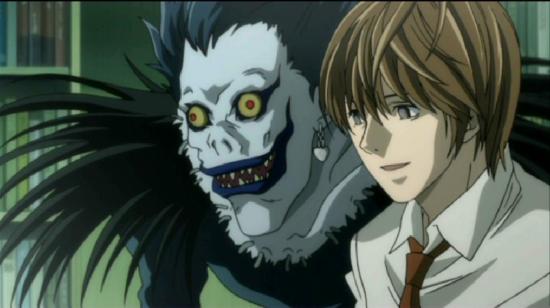
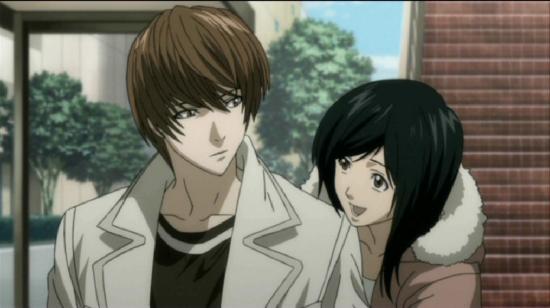
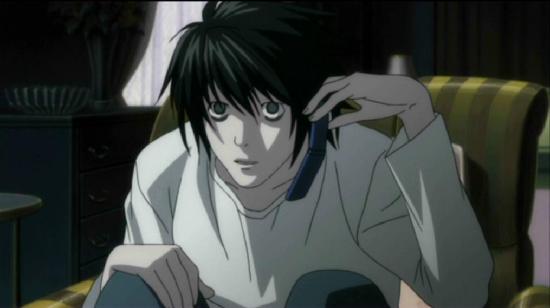
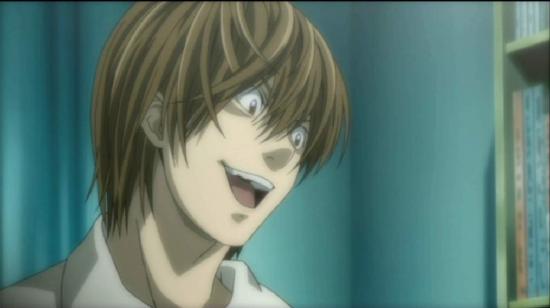
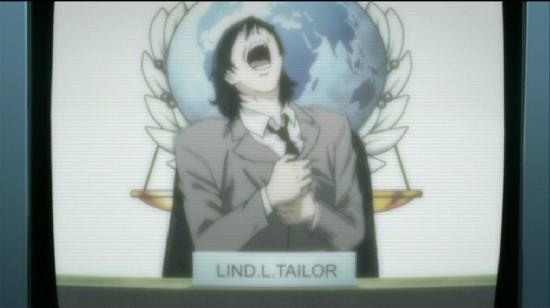
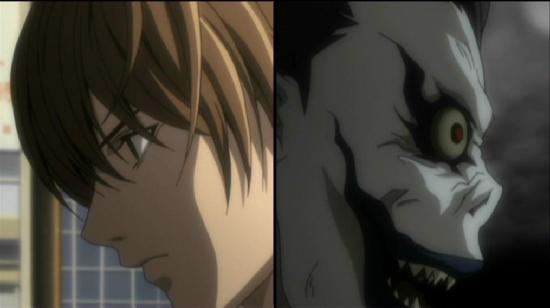
Your Opinions and Comments
Be the first to post a comment!